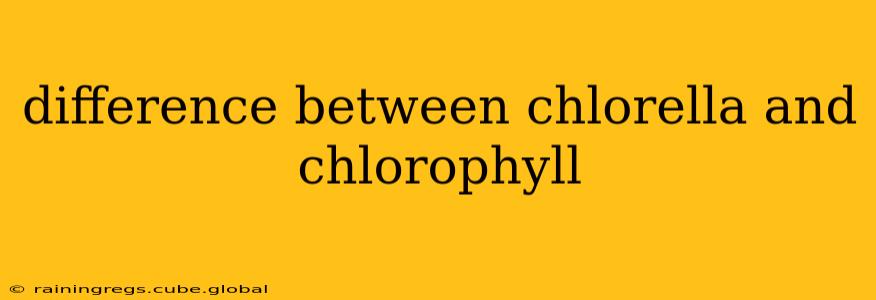Chlorella and chlorophyll are often mentioned together, leading to confusion about their distinctions. While closely related, they are not interchangeable. Understanding their differences is crucial for making informed choices about incorporating them into your diet or wellness routine. This article delves into the core differences between chlorella and chlorophyll, answering common questions along the way.
What is Chlorella?
Chlorella is a single-celled, spherical green alga, a type of microscopic plant found in freshwater. It’s a nutritional powerhouse, packed with vitamins, minerals, proteins, and antioxidants. Its vibrant green color comes from the high concentration of chlorophyll it contains, but chlorella is much more than just chlorophyll. It’s a complete food source, offering a diverse range of nutrients.
What is Chlorophyll?
Chlorophyll is a pigment found in plants, algae, and cyanobacteria. It’s the molecule responsible for capturing sunlight during photosynthesis, converting light energy into chemical energy that fuels the plant's growth. There are various types of chlorophyll, with chlorophyll a and chlorophyll b being the most common in plants. Chlorophyll is what gives plants their green color.
What's the fundamental difference?
The key difference lies in the scope: chlorophyll is a component of chlorella, much like iron is a component of spinach. Chlorella is a complex organism containing chlorophyll along with numerous other vital nutrients. Chlorophyll, on the other hand, is a single molecule.
Is Chlorella a Good Source of Chlorophyll?
Yes, chlorella is an excellent source of chlorophyll. Its high concentration of this pigment contributes significantly to its nutritional profile and potential health benefits.
What are the Benefits of Chlorella?
Chlorella’s benefits stem from its broad nutrient composition, not solely from its chlorophyll content. Proposed benefits, which require further research in many cases, include:
- Detoxification: Some believe chlorella aids in removing heavy metals from the body.
- Immune support: Its nutrient density may contribute to a healthy immune system.
- Improved energy levels: Its nutrient-rich profile might boost energy.
- Enhanced gut health: Chlorella can act as a prebiotic, feeding beneficial gut bacteria.
What are the Benefits of Chlorophyll?
Chlorophyll, isolated as a supplement, has also been associated with several potential benefits, including:
- Antioxidant properties: It can help neutralize free radicals, protecting cells from damage.
- Anti-inflammatory effects: Studies suggest potential anti-inflammatory properties.
- Blood sugar regulation: Some research indicates a possible role in blood sugar control.
Can I Get Chlorophyll from Other Sources Besides Chlorella?
Absolutely! Many green leafy vegetables, such as spinach, kale, and parsley, are rich in chlorophyll. Wheatgrass and barley grass are also excellent sources.
Which is better: Chlorella or Chlorophyll Supplements?
There's no single "better" option; it depends on individual needs and goals. If you seek a broad spectrum of nutrients, chlorella is a powerful choice. If you're primarily interested in chlorophyll's specific properties and prefer a more concentrated form, chlorophyll supplements might be suitable. However, remember that whole foods remain the best source of nutrients whenever possible.
Are there side effects of taking chlorella or chlorophyll supplements?
While generally considered safe, some individuals may experience mild side effects such as digestive upset (gas or diarrhea) when first starting chlorella supplements. Chlorophyll supplements are also generally well-tolerated but may cause mild digestive issues in some. It's always advisable to start with a low dose and gradually increase it. If you have any underlying health conditions, consult a healthcare professional before taking either supplement.
This detailed comparison clarifies the difference between chlorella and chlorophyll, highlighting their individual benefits and potential uses. Remember to consult with a healthcare professional before adding any new supplements to your routine.
